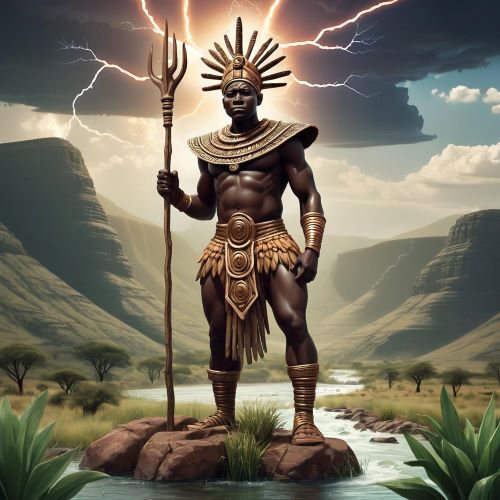Sotho Gods
The Sotho Gods are central figures in the traditional spirituality of the Basotho people, who primarily inhabit the highlands of Lesotho and parts of South Africa. Rooted in ancient African belief systems, the Sotho Gods represent a profound connection between humanity, nature, and the divine. These deities are often associated with the elements, fertility, rain, harvests, protection, and guidance. For the Basotho, reverence for the gods reflects an understanding that life is interwoven with unseen forces that govern the land, the weather, the seasons, and the health of the community.
At the heart of Sotho mythology is Modimo, the supreme being who is seen as the creator and ruler of all things. However, alongside Modimo exist a variety of other spiritual beings and ancestral spirits who serve important roles within the religious framework. The Sotho Gods often act as intermediaries between humans and the supreme deity, influencing daily life through blessings, omens, and signs. Ceremonial practices, offerings, and traditional prayers are ways through which people maintain harmony with these divine forces, seeking favor in everything from rainfall for crops to protection against misfortune.
The myths and legends surrounding the Sotho Gods are deeply tied to the natural world. Many stories feature gods who embody the forces of the earth, sky, and rivers, teaching lessons about respect for nature and community responsibility. These tales are preserved through oral traditions, songs, and rituals, passing down important values such as courage, wisdom, generosity, and respect for ancestors. The gods are often portrayed as both nurturing and powerful, capable of great benevolence but also demanding adherence to the moral codes that uphold societal balance.
Even today, the cultural practices inspired by the Sotho Gods continue to influence Basotho society. Many rituals, festivals, and rites of passage maintain elements of ancient spiritual practices, blending them with newer religious traditions. Ancestor veneration, rainmaking ceremonies, and the use of sacred spaces like mountains and rivers are all part of a living tradition that honors the memory of the gods. The resilience of these customs speaks to the enduring importance of the Sotho Gods in providing spiritual grounding and a sense of identity in a rapidly changing world.
In recent years, the Sotho Gods and their associated myths have attracted growing interest from historians, anthropologists, and enthusiasts of African spirituality. As people around the world seek to reconnect with indigenous knowledge systems, the stories and traditions of the Sotho Gods offer timeless insights into humanity’s relationship with nature, community, and the divine. Whether you are exploring traditional African beliefs, seeking inspiration from ancestral wisdom, or simply curious about world mythologies, the enduring legacy of the Sotho Gods provides a rich and meaningful journey into the spirit of the Basotho people.
The Sotho Gods are central figures in the traditional spirituality of the Basotho people, who primarily inhabit the highlands of Lesotho and parts of South Africa. Rooted in ancient African belief systems, the Sotho Gods represent a profound connection between humanity, nature, and the divine. These deities are often associated with the elements, fertility, rain, harvests, protection, and guidance. For the Basotho, reverence for the gods reflects an understanding that life is interwoven with unseen forces that govern the land, the weather, the seasons, and the health of the community.
At the heart of Sotho mythology is Modimo, the supreme being who is seen as the creator and ruler of all things. However, alongside Modimo exist a variety of other spiritual beings and ancestral spirits who serve important roles within the religious framework. The Sotho Gods often act as intermediaries between humans and the supreme deity, influencing daily life through blessings, omens, and signs. Ceremonial practices, offerings, and traditional prayers are ways through which people maintain harmony with these divine forces, seeking favor in everything from rainfall for crops to protection against misfortune.
The myths and legends surrounding the Sotho Gods are deeply tied to the natural world. Many stories feature gods who embody the forces of the earth, sky, and rivers, teaching lessons about respect for nature and community responsibility. These tales are preserved through oral traditions, songs, and rituals, passing down important values such as courage, wisdom, generosity, and respect for ancestors. The gods are often portrayed as both nurturing and powerful, capable of great benevolence but also demanding adherence to the moral codes that uphold societal balance.
Even today, the cultural practices inspired by the Sotho Gods continue to influence Basotho society. Many rituals, festivals, and rites of passage maintain elements of ancient spiritual practices, blending them with newer religious traditions. Ancestor veneration, rainmaking ceremonies, and the use of sacred spaces like mountains and rivers are all part of a living tradition that honors the memory of the gods. The resilience of these customs speaks to the enduring importance of the Sotho Gods in providing spiritual grounding and a sense of identity in a rapidly changing world.
In recent years, the Sotho Gods and their associated myths have attracted growing interest from historians, anthropologists, and enthusiasts of African spirituality. As people around the world seek to reconnect with indigenous knowledge systems, the stories and traditions of the Sotho Gods offer timeless insights into humanity’s relationship with nature, community, and the divine. Whether you are exploring traditional African beliefs, seeking inspiration from ancestral wisdom, or simply curious about world mythologies, the enduring legacy of the Sotho Gods provides a rich and meaningful journey into the spirit of the Basotho people.

